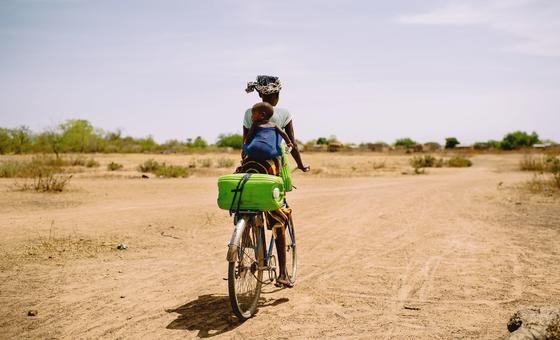A woman fetches water by bicycle in near Boromo in Burkina Faso.
Large parts of Burkina Faso are being terrorized by armed groups and the rampant insecurity is “beyond alarming”, said the UN human rights chief on Thursday following a brief visit to the country.
High Commissioner Volker Türk said, from the capital Ouagadougou, that his local office had been “engaging intensely with the authorities, civil society actors, human rights defenders, UN partners and others on many of the multifaceted human rights challenges” the country faces following a coup in January 2022 that saw Captain Ibrahim Traoré assume power.
Solidarity visit
“I came here to express my solidarity with the people of Burkina Faso at this difficult time and to engage on the human rights situation at the highest level,” said Mr. Türk.

The UN Human Rights Chief Volker Türk addresses the media at the end of his visit to Burkina Faso.
He expressed gratitude to Captain Traoré, in his role as President of the transition, adding that they had held in-depth and wide-ranging discussions “on the grave security situation”, the humanitarian crisis as well as climate change and environmental degradation.
They also discussed shrinking civic space, “inequalities, the need to forge a new social contract and on ensuring inclusive participation of all Burkinabe in the transition process” back to civilian rule.
Describing the suffering of Burkinabe as “heartbreaking”, the head of OHCHR said there are 2.3 million people who are food insecure, more than two million people internally displaced and 800,000 children out of school.
In all, around 6.3 million out of a population of 20 million people are in need of humanitarian assistance.
Falling off the agenda
“Yet, it has slipped off the international agenda and the resources made available are totally insufficient to respond to the scale of people’s needs,” said Mr. Türk.
Just last year, OHCHR documented 1,335 violations and abuses of human rights and humanitarian law, involving at least 3,800 civilian victims.
“Armed groups were responsible for the vast majority of violations against civilians in incidents involving more than 86 per cent of the victims. Protection of civilians is paramount. Such wanton violence must stop and the perpetrators held accountable.”
He said he understood the grave challenges faced by security forces and had been “encouraged by assurances that steps are being taken to ensure their conduct fully complies with international humanitarian and international human rights laws”.
The transition now needs to proceed “rooted in human rights”, he said, calling on the international community not to lose sight of the widespread needs in Burkina Faso.


